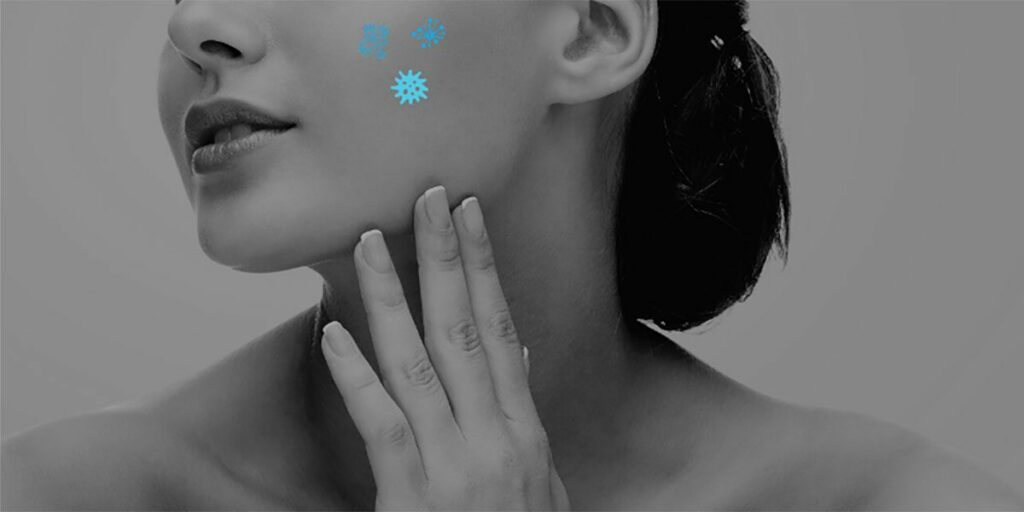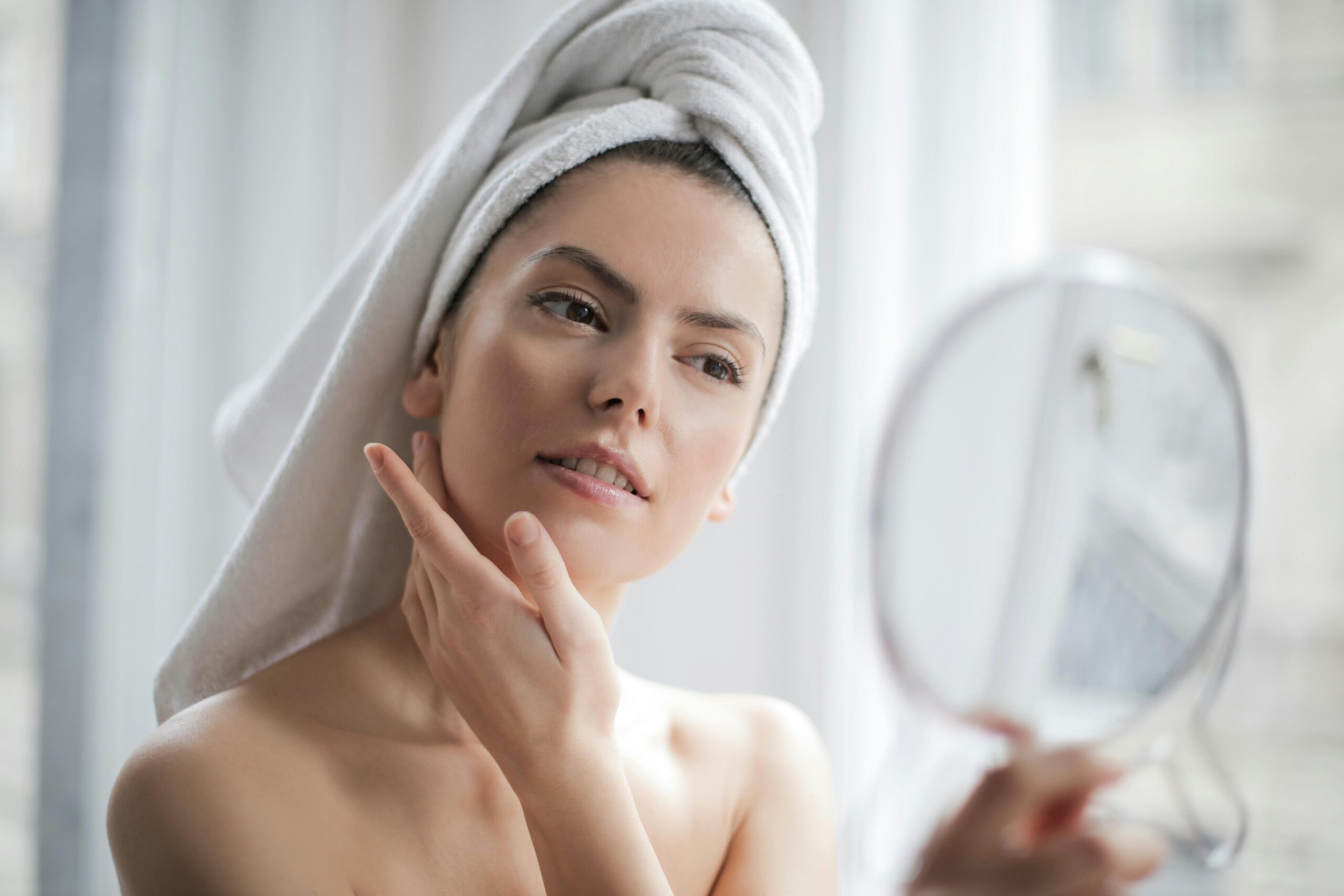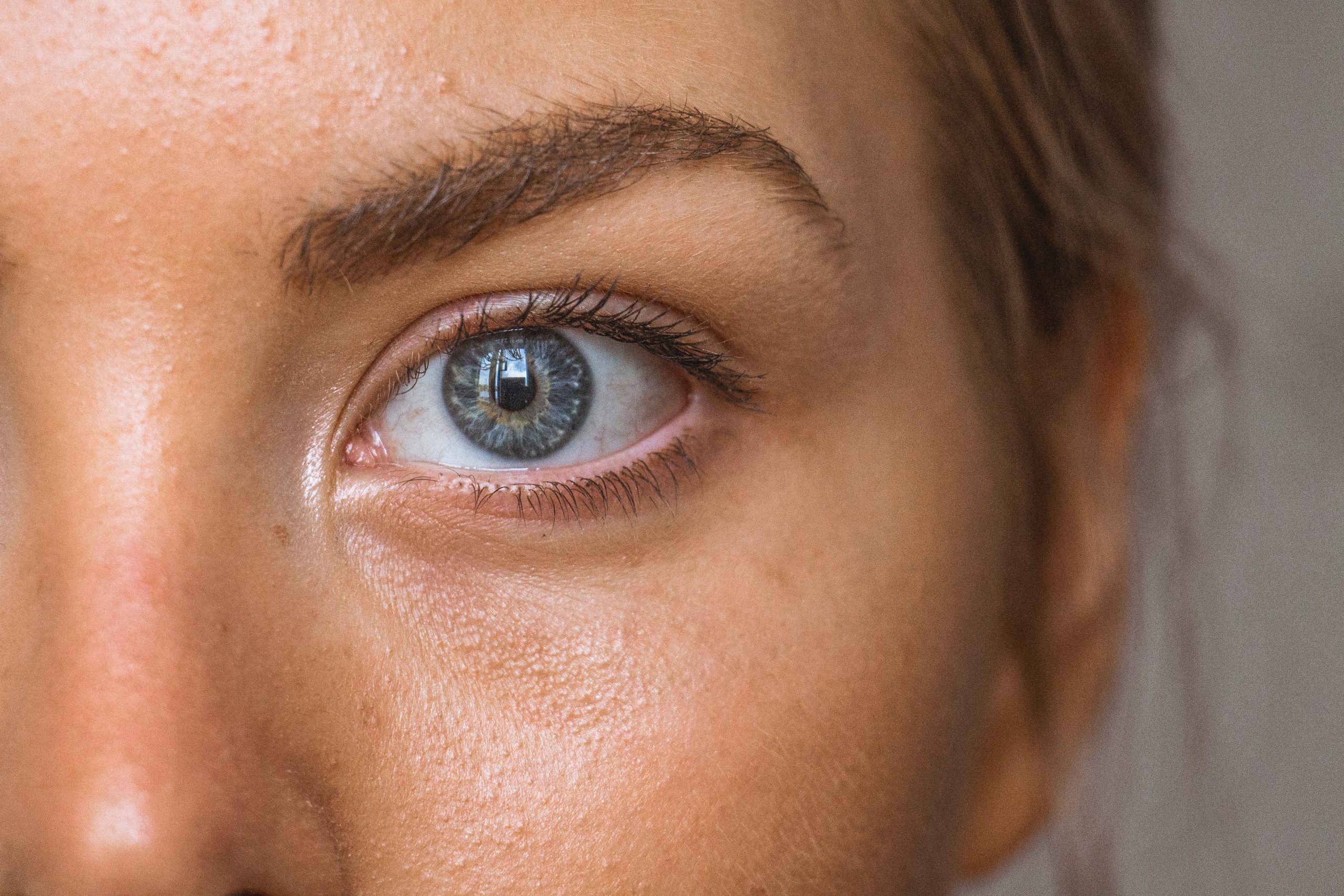As a beauty professional, you strive each day to provide your clients with the most nurturing, effective skincare treatments. You know your products inside out, and you know your craft better than anyone. So, why is it that sometimes a treatment you bestow one client, with visibly the same symptoms, has astounding results but on a different client, the results are minimal?
We all have our unique set of DNA and a highly personalised microbiota. The latest technology and science has just started unveiling these aspects of our human biology, presenting the fascinating opportunity for individualised treatment, skincare and cosmetics; the diversity of your skin microbiome is the key.
While we have covered this topic before (link to the blog: https://vitalplus.com.au/the-skin-microbiome-does-biodiversity-hold-the-key-to-optimum-skin-health/), research into this fascinating area is ongoing and still only in its infancy. There is so much more to learn and understand, and we are just at the tip of the iceberg. Thousands of researchers and scientists all over the globe work tirelessly to collect and analyse new data. Some fascinating facts are being revealed and published at a daily pace.
We continue to keep a close eye on the new research, and we are thrilled to share the latest updates with you right here!
The Skin-Gut Axis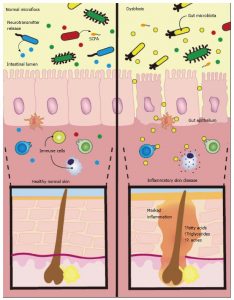
Research into the gut microbiome is now quite extensive, and there is a deep understanding of how gut health can impact overall wellbeing. However, the relationship between your gut microflora and your skin microflora is a growing area of research that could have exciting implications. Early insight suggests that if you have healthy gut microflora, it can be extremely beneficial for your skin barrier function. One thing we do know already is the impact of inflammation. When the gut lining is permeable, it leaks into the rest of the body, causing inflammation. This inflammation is seen throughout the body but perhaps most evidently on the skin. Skin conditions such as eczema, breakouts, puffiness and redness are all linked to inflammation stemming from the gut. A healthy gut microbiome seems to be crucial to a healthy skin microbiome.
The Skin-Brain Axis
The connection between the brain and the skin is an intriguing subject that has led to the rise of neurocosmetics over the past few years.
Simply put, neurocosmetics are non-toxic, bio-active topical products which contain unique ingredients designed to work on a neurological level. This indicates interactions between the skin and the nervous system that offers a different way to approach skin health and ageing.
Skin Microbiome and Age
New research highlights how the trillions of bacteria teeming on and in our bodies change as we get older. Researchers found that skin microbes, in particular, change so consistently over time that a sample of them can be used to predict someone’s age within about four years. In the future discovering whether someone’s microbiome actually aligns with their real age, could be a useful tool to assess overall health.
Postbiotic Skincare
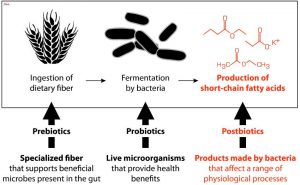
Whilst much is being discussed about prebiotics and probiotics in skincare, postbiotics are often neglected but are no less important. Postbiotics are the by-products of probiotics. We eat food, it ferments in the gut, and the result is postbiotics, namely short-chain fatty acids – in fact, they are the very point of pre and probiotics! Considering the strong links between gut bacteria and skin bacteria, the potential for topical postbiotics is huge!
Personalised Skincare
Increased understanding of the skin microbiome shows that 99.9% of our skin microbiome is unique! Like our fingerprints, no-one’s skin microbiome is the same. The one-size-fits-all principle just isn’t working when it comes to effective skincare, so what does the future hold?
The current understanding of the skin microbiome tells us that the future of skincare is personalisation. New testing tools will be developed to help health and beauty professionals to customise their recommendations and prescriptions. We are all unique, and our skin is no different…
Your Clients Are in the Know
Statistics from global market researcher, Mintel, have revealed mentions of the word “microbiome” in global skincare searches increased 130% between 2018 and 2019! Consumers are demanding transparency and clarity from brands about what ingredients they are putting on their skin and are increasingly questioning what ingredients do to our skin – including what it does to our skin microbiome.
The microbiome market is booming! With consumer appetite and the potential of the skin microbiome so vast, the best developments may still be on the horizon, but they will come, and as beauty professionals, it’s essential to remain a part of this educational journey.
Microbiome Friendly Products
One of the most important ideas that has come from skin microbiome research is the need for products that do not disturb the microorganisms on the skin. As Dr Gillbro, author of ‘The Scandinavian Skincare Bible’, highlights “These microorganisms are all like mini-factories – producing compounds that are both anti-inflammatory and humectant which promotes a balanced skin. We need to exclude anti-microbial ingredients such as high concentration preservative systems or harsh chemicals.”
Microbiome-friendly products are vital to good skin health. As we understand more about the influence the skin microbiome has on dermatological disease management, the interest in this area continues to grow exponentially. Popular beauty treatments such as microdermabrasion, laser and chemical peels, for example, all impact the microbial balance of the skin. The question we need to be asking ourselves is, are there other ways to address skin concerns that don’t compromise the skin microbiome?
Vital Plus and the Skin Microbiome
We are proud to provide products that align with the concept of supporting the natural skin microbiome. This is one of Vital Plus’s fundamental principles when selecting our skincare brands. They must nurture the skin microbiome and improve skin health. Here are some examples:
JooMo – A face cleanser and body wash that boost and support the natural skin microbiome. 100% genuinely natural and preservative free. It is the only clinically proven product which enhances skin biodiversity.
GERnétic – The process of fermentation used to create Gernetic products make them especially nurturing and healing to the skin microbiome and barrier function. Synchro cream; our hero product, due to its fermentation in probiotic algae, which provides all the benefits of postbiotic skincare.
Nimue – Built on the principle of protecting and preserving the acid mantle. With products supporting the natural microbiome environment on the skin, such as the Prebiotic Superfluid (for salon treatment use only). It’s a powerful nutritive supplement for the beneficial bacteria on our skin, and it also stimulates skin immunity.
In Conclusion
While understanding of the skin microbiome is still evolving, and there is so much more to be learned and discovered, this field will be the key to personalised beauty and health solutions.
We urge you to stay on top of new trends in this arena and continue to take a holistic approach to beauty so that you are always striving to give your clients the best.
What we apply to our skin can dramatically affect the health of the skin, and with growing consumer awareness, we are headed towards a new era. As the renowned skincare expert, Chiza Westcarr, states: “I honestly believe that we are heading towards a time when less will indeed be considered more.”
For more information on our range and their impact on the skin microbiome, contact the office and book your discovery session with our educators.
FAQs:
Q: What is the skin microbiome, and why is it essential in beauty therapy?
A: The skin microbiome refers to the diverse community of microorganisms that live on the surface of our skin. These microorganisms include bacteria, fungi, and viruses, which coexist in a delicate balance. The skin microbiome plays a crucial role in maintaining the skin’s health, as it helps protect against harmful pathogens, supports the skin’s barrier function, and regulates inflammation. In beauty therapy, understanding and nurturing the skin microbiome have become increasingly important as it can lead to better skincare results and overall skin health.
Q: How does the skin microbiome affect common skin conditions?
A: The balance of the skin microbiome has a significant impact on various skin conditions. For instance:
- Acne: An imbalance in the skin microbiome can contribute to the development of acne. Propionibacterium acnes, a type of bacteria, is known to be involved in acne formation.
- Eczema: Those with eczema often have a disrupted skin microbiome, leading to increased inflammation and skin barrier dysfunction.
- Dryness: A healthy skin microbiome can help retain moisture, preventing excessive dryness.
- Aging: An imbalanced skin microbiome may lead to increased oxidative stress and premature aging.
Q: How can beauty products support a healthy skin microbiome?
A: Several beauty products are designed to support and maintain a healthy skin microbiome. Some strategies include:
- Prebiotics: These products contain ingredients that nourish beneficial microorganisms, promoting their growth and balance on the skin.
- Probiotics: Beauty products with probiotics contain live beneficial bacteria that can directly contribute to a balanced skin microbiome.
- Gentle Formulations: Harsh chemicals in skincare products can disrupt the skin microbiome, so gentle and pH-balanced formulations are preferred.
- Microbiome-friendly Ingredients: Many products now include microbiome-friendly ingredients that support a diverse microbial community.
Q: Can lifestyle habits influence the skin microbiome?
A: Yes, lifestyle habits can significantly impact the skin microbiome. Some factors that influence it include:
- Diet: A diet rich in probiotics and prebiotics, such as fermented foods, can positively influence the skin microbiome.
- Hygiene Practices: Over-cleansing or using antibacterial products excessively can disrupt the skin’s microbial balance.
- Stress: Chronic stress can negatively affect the skin microbiome, leading to skin issues.
Q: Is it necessary to consult a professional for incorporating microbiome-focused beauty therapy?
A: While some skincare routines can be self-guided, it is beneficial to consult a skincare professional or dermatologist, especially when dealing with specific skin concerns. They can help assess the condition of your skin and recommend suitable microbiome-focused products and treatments tailored to your individual needs. A professional’s expertise ensures that you make the most of the latest trends in microbiome beauty therapy while addressing any unique skin issues you may have.
Sources/Further Reading:
https://thesecretlifeofskin.com/2020/05/29/global-microbiome-trends/
https://www.professionalbeauty.com.au/beauty/skincare/lessons-on-the-skin-microbiome/#.XxkJGvgzaqB
